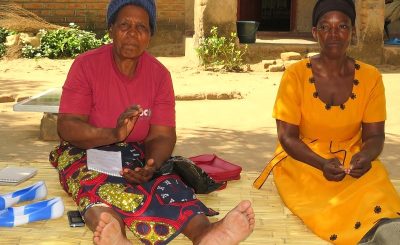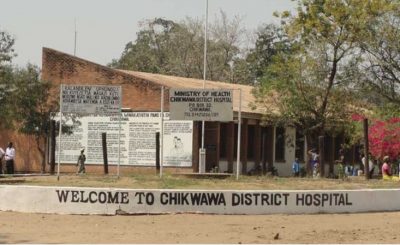Corruption continues to be one of the key challenges hindering the social and economic development of many economies globally including Malawi.
This is why the country saw it fit 25 years ago that the vice be dealt with tooth and nail by instituting a sole body mandated curb the vice in the name of Anti-Corruption Bureau (ACB).
Under the Corrupt Practices Act, the Bureau is mandated to perform four major functions which are Corruption Prevention, Public Education, Corruption Investigations and Corruption Prosecutions.
In this special assignment report, we discuss how the Bureau, which is an independent body legally mandated to lead Government’s efforts in the fight against graft has fared in the combat focusing on the private sector. This is because, according to the ACB, the sector is both a facilitator and a victim of corruption.
In the 2022 Transparency International’s Corruption Perception Index, Malawi found herself at the 110 position out of 180 countries, scoring 34 points.
It is a notable ranking for a country aspiring to uphold effective governance and strict adherence to the rule of law as outlined in the national blueprint – Malawi 2063.
To propel effective progress and slash the current score from 34 to at least 42 by 2030, a multisectoral approach is crucial in the fight against graft. ACB Director General Martha Chizuma strongly advocates for the private sector’s active collaboration and partnership in combating corruption.
“It’s not just any other private sector. It’s a private sector that is corruption free. Because it gives confidence that as we move into the next 25 years of anti-corruption efforts, as the country we move towards achieving our aspirations, those 2063 aspirations could not just be dreams, we could actually achieve them,” said Chizuma.
On corruption prevention, Chizuma underscores that the bureau undertakes to review systems and procedures in public and private institutions to change systems that are weak and discourage corrupt activities.
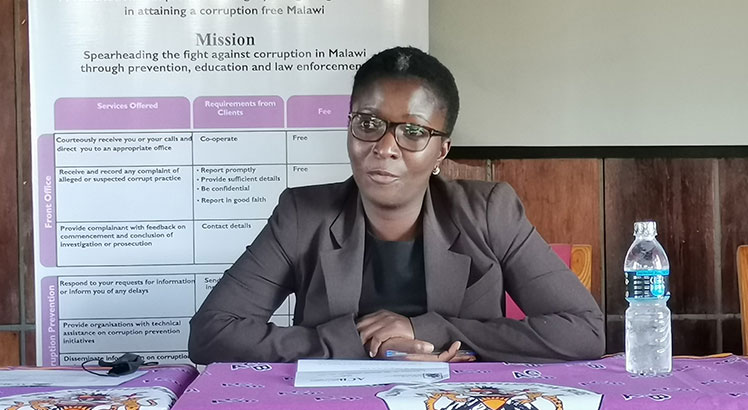
ACB also helps institutions develop corruption prevention strategies that will ensure that corruption is fought from within institutions.
Now, let us walk the talk. One of the country’s cement manufacturing giants, Shayona Cement Corporation Limited, is exemplifying this commitment, as shared by its Human Resources and Administration Manager, Austin Mvula.
He said: “We are donating in kind, donating in kind means we are not donating money, but we are donating the project. Previously, we would just donate or just construct a school block and give them.
“But this time around, the community said no, we need to be involved, we need to choose which projects we want. So now the community identities the project and leave it to us to do the works.”
Following Mvula’s lead, Castel Malawi Limited, the leading producer and distributor of beverages, boldly declares itself corruption-free. Gloria Zimba, their Human Resources and Corporate Affairs Director, emphasizes the internalization of the fight against graft among Castel’s staff.
“Castel is a corrupt free organisation and we will try our level best to continue to try to put in as much funding as we can to fight corruption internally. We want it every employee to internalise the fight. It’s not a fight which management can do on its own or ACB, or government can do it on its own.
“Every individual is being called upon to be responsible to take that responsibility to blow the whistle when they see any corrupt practices or when they see bribery action taking place,” Zimba said.
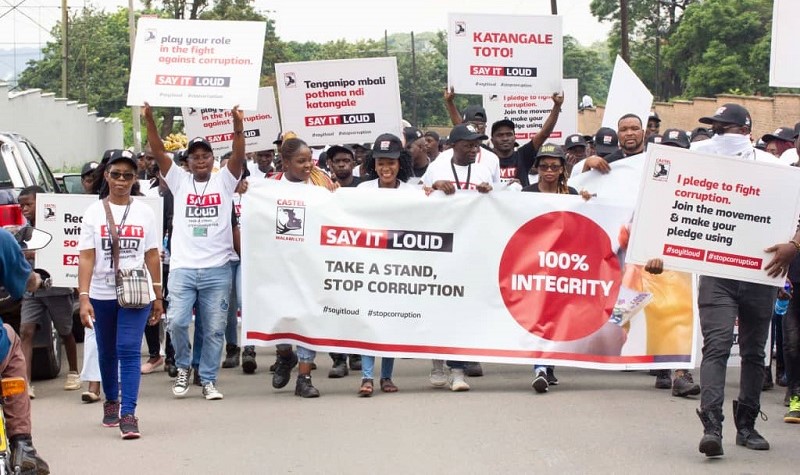
Despite these efforts, the 2019-2024 National Anti-Corruption Strategy II reveals that corruption is rampant in the private sector, where companies grapple with graft and bribery across various operations.
The Malawi Confederation of Chambers of Commerce and Industry (MCCCI) throws its weight behind the ACB’s proposal to prosecute alleged corrupt practices within the private sector.
Madalitso Kazembe, who is the Confederation’s Director of Business Environment and Policy Advocacy, adds that the move is not a surprising one.
She said: “As private sector. I think we are really not surprised with that development ACB usually consults us on many aspects so that does not come as a surprise to private sector, and I should also mention that as a private sector, we do feel like corruption is not ideal for any country to develop therefore, whatever means is used to curb this vice is acceptable and welcome to us.”
While lauding positive progress made by the Bureau in the past 25 years, Willy Kambwandira from the Center for Social Accountability Transparency (CSAT) feels that both authorities and the ACB might be leaning more towards rhetoric than action.
“The danger is that they seem to be a lot of talk than action from the Bureau itself, even from the authorities itself, the law demands that everyone is equal before the law.
“So, where corruption involves individuals in the private sector let the law apply, but we are not seeing that. So, for us, who would be happy to see that there is no selective application of the law,” said Kambwandira.
However, the Economics Association of Malawi (ECAMA) deems the ACB’s move overdue, especially considering the prevalence of corruption within the private sector.
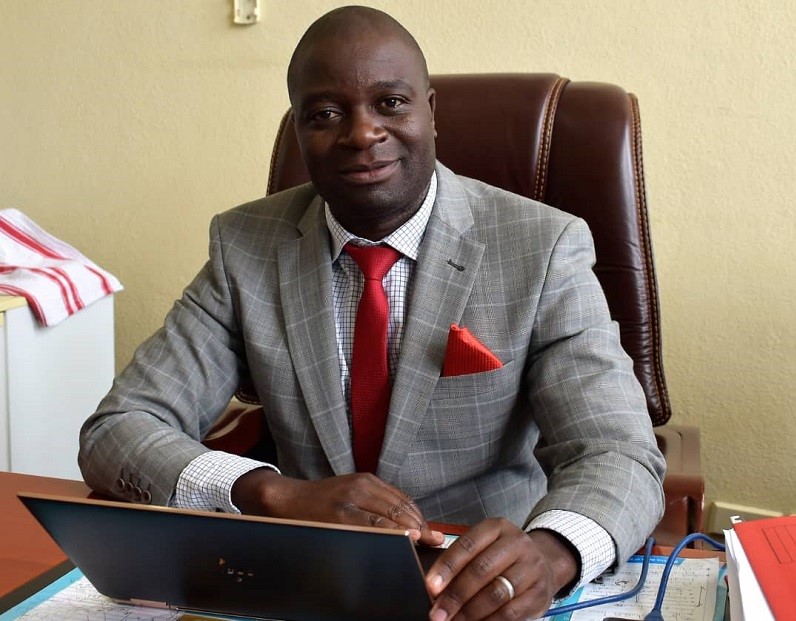
Dr. Betchani Tchereni, former president of ECAMA and now Secretary to the Treasury, shares his insights on the matter.
“We can’t say that the fight against corruption has been to the level that one would want to be proud about No, we haven’t done that, whether it is corruption by or for in the private sector or the public sector.
“But really, corruption issues they have not been attended to the way they should have been attended to. We haven’t seen many prosecutions, we haven’t seen many convictions also to some extent, we actually wonder that to say the guys at ACB What are they doing?” questioned Dr. Tchereni.
In the past two and half decades, ACB registered and processed a total of 36,878 of which 10,615 representing 29 percent were recommended for investigations whereas 26,210 representing 71 percent were either closed or referred to other relevant institutions.
The highest number of complaints recommended for investigations was in 2017, of which the Bureau understood it was due to likely issues of cash agate.
Shifting gears, the National Anti-Corruption Alliance (NACA), led by its Chairperson Moses Mkandawire, believes that beyond raising awareness on corruption, the focus needs to turn towards ensuring integrity in various sectors, whether private or public.
Said Mkandawire: “This does not necessarily require one person, it requires a multifaceted approach, that we cannot just leave this to ACB, let’s create integrity committees in a number of these bodies so that they can be checking on those actors who are within the procurement system, monitor them regularly, and provide reports within reasonable time.”
As the country aligns herself with the vision of Malawi 2063, there is acknowledgement of the realities of elite capture, political interests, and pervasive corruption that can impede the change and reform process.
Now, the critical question arises: how can the country create a conducive business environment by streamlining bureaucratic processes for investment and developing economic infrastructure?
Malawi’s ambitious target is to secure a top 20 world ranking on both indicators by 2063, encompassing the next 25 years of the ACB.
Produced with support of the European Union



